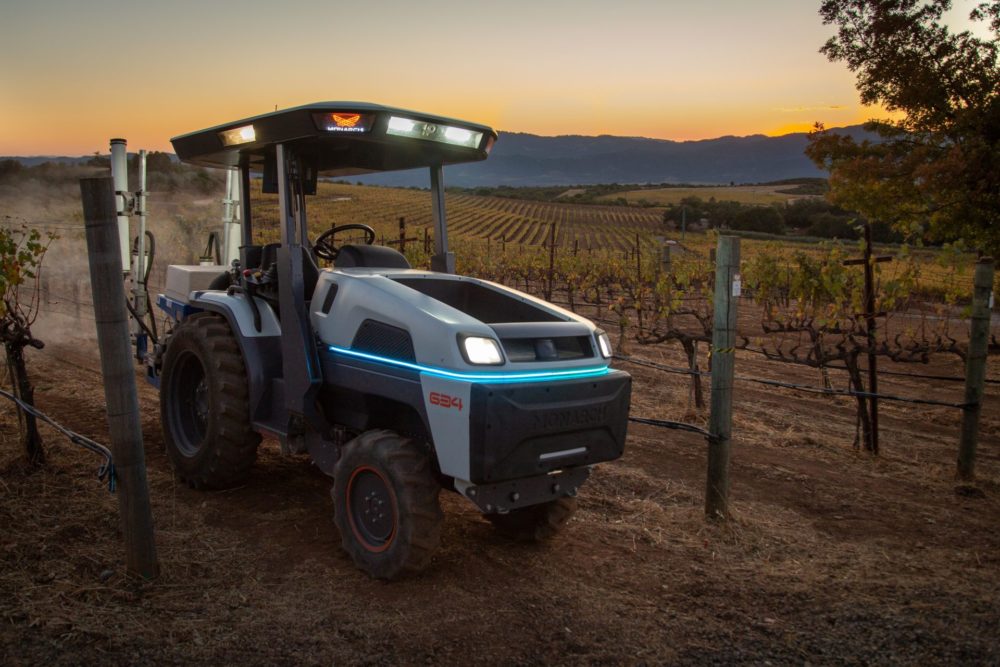Autonomous tractors may seem like a futuristic idea. But if you want to sell one to a farmer, don’t call it a robot, says Monarch Tractor co-founder and CEO Praveen Penmetsa.
“Five years ago we came up with a very futuristic-looking machine. What we learned is that the tractor is a very emotional shape – farmers love their tractors [the way they are],” he tells AFN.
“So we had to throw away our futuristic drawings. Now, our tractor is still a tractor. The farmer can use it with their existing implements and see the value the moment it hits their field.”
Monarch Tractor just raised $20 million in a Series A round led by Japanese auto parts maker Musashi Seimitsu Industry Co, ag equipment manufacturer CNH Industrial, and Indian tractor and implement company VST Tillers Tractors. San Francisco-based At One Ventures and New York sustainability-focused investment group MUUS also participated in the round.
Penmetsa ascribes the investment from major tractor makers to a growing interest in electrification, which has been gaining momentum in the consumer automotive realm.
In addition to building self-driving, electric vehicles, Monarch Tractor also serves as a data hub – which many users have referred to as the icing on the cake, according to Penmetsa.
“It provides real-time alerts of what’s happening in their fields, which saves them time scouting. That is one of the most expensive resources – going around on [all-terrain vehicles] trying to look at the farm,” he says.
“Many existing operations happen at night between the hours of 8pm and 5am. Knowing the tractor driver did the right job, at the right speed, and what the wind conditions were along with the temperature and the area they covered, is hugely powerful.”
There’s also the ‘driver optional’ feature, which allows an existing tractor operator to manage a fleet of five to seven tractors.
Selling farmers on electric tractors
The new funding will be used to build a micro-assembly line in Livermore. Monarch Tractor has a received number of pre-purchase deposits from what it describes as some of the largest farmers in the vineyard game, according to Penmetsa.
He describes the first set of tractors going out to farmers as the “pilot series,” which will head to farms in California, Oregon, and Washington. After this, Monarch Tractor will introduce a “production series,” which will be closer to a large-scale tractor.
The vehicle retails for $50,000, which is fairly competitive with conventional tractors on the market today. This price includes access to the startup’s data-tracking software.
For Penmetsa, price parity has always been a major focus knowing that farmers are hesitant to shell out big bucks for a cutting-edge technology.
“Farmers cannot afford aspirational technologies. They’re not willing to spend $80,000 to $100,000 on some futuristic tractor with the hopes of it working,” he says.
“Our tractor has to be robust the moment they start working on it. There are no two-year RoI sales on our side. It has to provide an RoI within eight to 18 months according to what we are seeing now.”
Tractor ‘upfitter’ Bear Flag Robotics scores $7.9m seed round extension – read more here
Getting the price down to an affordable range involved “focussing on the things that farmers want most and not a single bell or whistle beyond,” Penmetsa says. He also attributes innovative electrical architecture allowing the whole vehicle to be powered by a single motor as another factor in achieving its competitive price tag.
To sell its vehicle, Monarch Tractor has primarily opted for on-farm pilots. Many farmers need to see something in order to believe it, especially when it comes to innovations, Penmetsa says.
Still, some farmers are on the fence about investing in an electric tractor. Many are waiting to see one on their neighbor’s field, or want multiple demonstrations. Due to limited capacity, Monarch Tractor is prioritizing demos for operations with larger fleets for the time being. For sustainability or cost-efficiency reasons, a number of farms are interested in converting 30% to 50% of their tractor fleets to electric vehicles.
Self-driving option
Labor also plays a role in encouraging farmers to consider autonomous options. Tractor operation is skilled work, and that kind of expertise can be in short supply in agricultural communities – particularly during the busy season. Covid-19 has further exacerbated the labor challenge by impacting immigration and operations.
“During the wildfires that happened in Napa [last year], a number of farmers wanted to perform field operations, but the air quality was so bad. They could not justify putting a person on a tractor,” Penmetsa explains.
“[They’ve] now connected the dots between the dangers they put field equipment operators in. Even in the best-case scenario, they’re still being exposed to dangerous chemicals or the dangers of operating a tractor in general. Farmers are coming to us now saying, ‘We don’t feel comfortable anymore and we are ready to be part of the solution.'”





